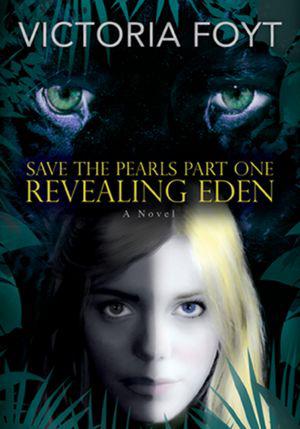
“Save the Pearls: Revealing Eden”, Victoria Foyt’s Young Adult dystopian book, is title that does not imply the black-dominated post apocalyptic world she attempts to write. After what appears to be a disaster caused by global warming and radiation, darker skin offers protection, and the caste system reverses. Apart from many instances that show a lack of research and writing skill, the biggest issue starts from the girl in blackface on the cover and stretches tortuously on. Racism is like fire on the internet; whenever someone gets even a whiff of it, all hell breaks loose. In this case, this book gives off a good deal more than a whiff. For those that are new to this controversy, here is an introduction to the train wreck that is this novella.
In the Amazon summary, the focus of the main character Eden’s struggles is not an acceptance of humankind and equality, but survival through marriage – “If only she can mate with a dark-skinned Coal from the ruling class, she’ll be safe.” Eden embodies the trope of a beautiful, weak, white girl that must rely on men to move up in class. Despite the marginalization of being a white-skinned, she is constantly seeking to have her beauty and worth validated. On the other hand, the black women are stereotyped with curvy bodies and are minor characters.
Eden and all whites are mocked as Pearls, Pearl being the “pejorative term here.” This is where the first of many problems lies. Why is pearl, a word that is associated with purity and precious jewelry used as the supposedly derogatory term? Chalk, bird poop, and any number of distasteful white names could have been used instead. If you argue it is to go along with gemstone labels, then I invite you to look at the term for the black-skinned people, “Coal.” Asians are “Ambers,” Latinos are “Tiger’s Eyes,” then why can’t the superior Blacks be Onyx, Obsidian, Spinel, or something equally of value? This culminates within the first few pages, where Eden shouts “Get your hands off me, you damn Coal!” Coal is clearly being used as an insult, and yet still no other term of preference is ever presented. Eden also continues to refer to them as “them”, a separation of identity that indicates she looks down upon them, not the other way around.
The summary goes on to say, “Eden must change to survive but only if she can redefine her ideas of beauty and of love.” However, this attempt at “change” is never really shown. Making contact with an ambiguous tribe of natives (that all speak Spanish in the jungle), Eden shows a further disgust towards the foreign culture. Instead, she counts herself superior to them, blind to the fact that this is how she is being treated. Rather than teaching that beauty comes from human empathy, Eden only desires an outward appeal.
In the end, Eden finds her mate in a half-panther, half-human black male. Even his normal actions were described as animalistic, the half-animal side only furthering the image of uncontrollably “beastly” black men. While Eden ends up mating with one, it is merely a cheap resolution of overcoming prejudice.
Comments on the book’s Facebook page like this one highlight what actual minorities have criticized about the book:
“You don’t think even creating a world in which blacks being dominant is the scariest thing in the world WHEN THAT IS ALREADY WHAT PEOPLE THINK is problematic? You don’t think that contributes to our oppression?”
Victoria Foyt has repeatedly claimed to not be racist, but her refusal to acknowledge the damage in her book shows otherwise. Racism is not solved through ignorance.

